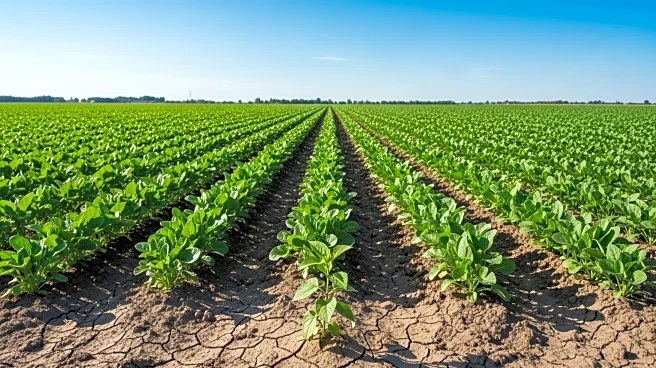What is the story about?
What's Happening?
Recent research highlights the growing risk to the global food supply due to modern agricultural practices that degrade soil resilience. Soil resilience is the ability of soil to withstand and recover from disturbances, including routine farming activities and extreme environmental pressures like droughts and floods. The study, published in NPJ Sustainable Agriculture, reveals that intensive practices such as plowing, fertilizer application, and irrigation, while boosting short-term yields, often lead to soil degradation. This degradation reduces the soil's capacity to cope with environmental and political disruptions, posing a significant threat to food security. The research underscores the importance of healthy soils, which support 95% of global food production and store more carbon than all the world's forests combined. Key threats identified include erosion from over-plowing, salinization from irrigation, pollution from pesticides, and soil compaction from livestock operations.
Why It's Important?
The degradation of soil resilience has profound implications for global food security, biodiversity, and climate stability. As soils become less capable of recovering from disturbances, the risk of erosion, salinization, pest infestations, and reduced crop productivity increases. This could lead to tipping points where productivity collapses irreversibly, affecting food and trade networks worldwide. The study warns that ignoring soil resilience could leave farming systems vulnerable to such failures, threatening global stability. With the UN estimating that a third of soils are already degraded, the urgency to address these issues is growing, especially as food demand rises in regions like sub-Saharan Africa, South America, and Southeast Asia.
What's Next?
The study calls for a reevaluation of land management practices to balance short-term productivity with long-term soil resilience. It suggests alternatives like conservation tillage and integrated pest management to slow or reverse soil damage. However, these solutions require careful consideration of trade-offs. The authors emphasize the need for a shift in agricultural practices to prevent further soil degradation and ensure food security for future generations. As global awareness of soil health increases, policymakers and agricultural stakeholders may need to implement strategies that prioritize soil resilience alongside productivity.
Beyond the Headlines
The findings highlight the ethical and environmental dimensions of modern agriculture, urging a reconsideration of practices that prioritize immediate yield over long-term sustainability. The degradation of soil resilience not only threatens food security but also impacts biodiversity and climate stability. As soils store significant amounts of carbon, their decline could exacerbate climate change. The study advocates for a holistic approach to land management that considers the interconnectedness of soil health, food security, and environmental sustainability.














